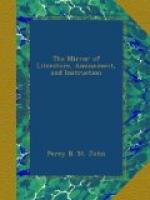Cost of a pound of Seven Shilling Tea.—Take a pound of Congou for instance, according to the evidence of Mr. Mills, a tea broker, before the House of Lords:
One pound of good Congou,
put up at the East India
Company’s sales at --------------- 1 8
Buyers purposely and for
their own advantage raise it ----- 0 9
——
Purchasing price by the Brokers —– 2 5 Duty levied by the Crown ----------------- 2 5 Retailer’s profit, brokerage, &c. -------- 2 2 —— Shop price 7 0
Thus it will be seen, the tea that the Company offers for sale to the consumer at 1_s_. 8_d_., or at the utmost say 2_s_., is enhanced to 7_s_. before it finds its way to the drinker’s breakfast table.
Coffee-Shops.—There are 3,000 coffee shops in London, in which are daily consumed 2,000 lbs. of tea and 15,000 lbs. of coffee. The consumption of coffee in these establishments has increased as follows:—In 1829, 1,978,600 lbs. In 1830, 2,251,300 lbs. In 1831, 2,899,870. Of tea the increase has only been, during the same periods, 239,700 lbs.—249,400 lbs.—263,000 lbs.
[3] A celebrated Hungarian,
named Cosmoes de Koeroes, has lately
discovered
in a Thibetian monastery, where he has been engaged
translating
an Encyclopaedia, that lithography and movable
wooden
types were known to the Chinese many centuries
ago.
[4] A Chinese who leaves his
country is considered as a traitor,
and
is punished with death if he ever return to it.
[5] The grand maxim of Confucius
is, “to despise foreign
commodities.”
[6] The Chinese use this stimulant
as we do wine and spirits, and
with
perhaps, less deleterious consequences to their health,
and
less evil results to their morals.
[7] About 7,000,000 of which,
or bars or moulds of silver to that
amount,
are sent to India, the Chinese being unable to make
sufficient
return in merchandise. This remittance is of
material
assistance in helping to provide funds on the spot
for
the purchase of tea.
[8] A late No. of the Canton
Register, mentions a fact, which is
one
instance out of many, of the desire to be independent
of
foreigners;
it is as follows:—“Prussian blue,
an article
which
was formerly brought in considerable quantities
from
England,
is now totally shut out from the list of imports,
in
consequence of its mode of manufacture being acquired
by a
Chinaman
in London; and from timely improvement it has been
brought
to that perfection which renders the consumers
independent
of foreign supply!"




